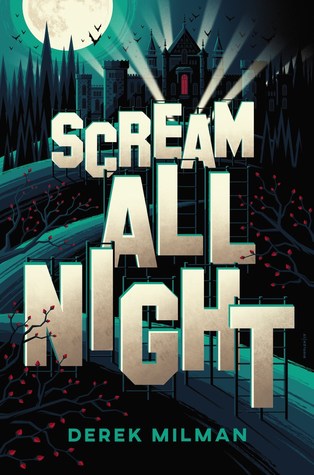New Release & Guest Post: Scream All Night by Derek Milman
Scream All Night by Derek Milman releases tomorrow, and we were excited to connect with him ahead of his release to talk about contemporary world building! So many readers may think that world building only exists in fantasy and sci-fi, but there is so much that goes into the world no matter what the genre. Check out Derek’s awesome guest post on the topic & be sure to check out his debut YA novel, Scream All Night!
 Scream All Night by Derek Milman
Scream All Night by Derek Milman
Category: Young Adult, Contemporary
Publication: July 24th, 2018; Balzer + Bray
Purchase: Amazon, Book Depository
A darkly hilarious contemporary realistic young adult novel about growing up and finding your place in the world, perfect for fans of Me and Earl and the Dying Girl and Running With Scissors.
Dario Heyward knows one thing: He’s never going back to Moldavia Studios, the iconic castle that served as the set, studio, and home to the cast and crew of dozens of cult classic B-horror movies. It’s been three years since Dario’s even seen the place, after getting legally emancipated from his father, the infamous director of Moldavia’s creature features.
But then Dario’s brother invites him home to a mysterious ceremony involving his father and a tribute to his first film—The Curse of the Mummy’s Tongue. Dario swears his homecoming will be a one-time visit. A way for him to get closure on his past—and reunite with Hayley, his first love and costar of Zombie Children of the Harvest Sun, a production fraught with real-life tragedy—and say good-bye for good. But the unthinkable happens—Dario gets sucked back into the twisted world of Moldavia and the horrors, both real and imagined, he’s left there.
With only months to rescue the sinking studio and everyone who has built their lives there, Dario must confront the demons of his past—and the uncertainties of his future. But can he escape the place that’s haunted him his whole life?
Guest Post:
It seems you get asked quite a bit about the horror and movie studio aspect of your world building (The Collector is so underrated!) and we are interested in hearing more about the world building process for the contemporary side of the story. Dario has to face his demons – the ones haunting him emotionally. Tell us about the elements of your teenage experience you bring to the story and what was the research and execution process like for the human side of things.
This is an interesting question at this moment in time, because I just got this strange email a few weeks ago inviting me back to my summer camp in Maine for a reunion of sorts. I was offered the honor of paying a few hundred dollars to “re-live some old memories” and because I obviously have a dark sense of humor, I wondered how much extra it would cost to bring back the tight group of hulking, homophobic bullies from Baltimore who would torment me, steal my things, and beat me up in the dead of night, when there was nothing but that endless purr of crickets.
It was a slightly militarized, highly athletic all-boys camp, and I was the slouching, freckled, sensitive, bookish kid from Westchester who wanted to fit in so bad, I was dead-set on making this work. I couldn’t admit to my parents how much I hated sports, especially regimented routines of different kinds of sports, how much I just wanted to go to theater camp or something. I learned later I didn’t want to make lanyards for three hours a day either, but I needed something else; this wasn’t my world.
These boys were all older than me, they knew each other already, and had this primal, cruel sense of Darwinism—ejecting the kid who somehow didn’t belong from the herd. I grew claws that summer, claws I still have to this day, as a defense against bullying, and I was never really all that soft again. I became more brittle and wry. I learned about the thinnest layer of humanity, and how we really are all survivors of the fittest to varying degrees, and really have to fight for our place.
The funny thing is, it was a beautiful place: with endless rows of pine trees, rolling hills, wooden cabins, set against the backdrop of this picturesque sparkling lake. And after I got that email (I’ve had endless dreams about being back there, going back, to this day) I was like: ohhhh, a really beautiful place, forever enmeshed in my dreams, where some really nasty shit went down. THAT. SOUNDS. FAMILIAR…
Moldavia, and SCREAM ALL NIGHT, comes from many shards of many real things from my life, as zany as the setting of the book is. I think it very much comes from my sense of never really fitting in anywhere. When I finally achieved my ideal—getting my MFA in acting at the Yale School of Drama, I had to contend with even more silly little cliques, and the creaking unnecessary flaws of an iconic institution; people, and places, will ultimately all disappoint you in various ways. As in the book, there will always be spiders crawling out of those flowers. You can’t just get the flowers. There’s no such thing.
I have to acknowledge that I came from privilege, there’s no skirting around that. I was very lucky. I had it easier than lots of people—a cushy upbringing in a cushy suburb, but that doesn’t mean there wasn’t personal struggle, a bitter taste of un-belonging that didn’t quite peter out till mid-college, and even then, only in soft drips during a dizzy, hectic time of life. Despite everything that had been given to me, I still often felt like I was failing, that I wasn’t good enough. And there was immense pressure, always, to succeed on every level, and a sense that if you couldn’t, well, your life, and what it would be, was all laid out for you: if you couldn’t get into a good college, you were doomed to a hardscrabble life.
I was a neurotic teenager who was really good at some things, but not at others. I was a good writer, I was interested in history, but I was terrible at math and science (my left brain has always been sort of bizarrely dormant, even with choreography, even with music), so in high school I was in both Honors AP classes and remedial classes, participating daily in opposite ends of the teenage human spectrum: the intellectual crème de la crème, and those who would barely make it out of high school. I don’t think anyone in my school quite had that same experience, and this was a top public school, highly competitive, in John Cheever country.
Most kids got shipped off to Princeton, Yale, Harvard…maybe Stanford, Penn, Brown. I got accepted to Northwestern, which at the time was almost punk rock. Part of it was due to the fact that I was publishing my own humor magazine, selling it to stores, and The New York Times wrote a profile on me. Places where I thought I wanted to go, like Wesleyan, Brown, and Penn, weren’t able to see past the numbers into the person, so I wasn’t accepted there, and thankfully avoided all that Eastern Seaboard sameness to a degree.
Northwestern saw something interesting in me, which was interesting in itself; they could tell I had more going on, and subverted the trope that every incoming freshman had to be Da Vinci-style well rounded at everything, which never made sense to me. Who could go on to do everything? I thrived at Northwestern. It’s where I started really writing. And, I’ll note, in the years since, Northwestern has steadily climbed the ranks of the best colleges in this country; the amount of people who attend the school and go on to lead successful, often public lives, is quite staggering. It was regarded as an Ivy League equivalent even then.
When I got accepted to grad school at Yale, there was already a smoking battlefield of parents sitting quietly at dinner tables wringing their napkins, whose children, despite ironclad legacies, hadn’t been accepted where they had hoped. Not many people, in fact, do go on to Harvard or Yale. They didn’t realize that. I could sense the whispers that somehow I didn’t deserve to be at an Ivy League school, or its equivalent; that I wasn’t as brilliantly well rounded as their own children, and had somehow stolen a spot that wasn’t mine, because I excelled at the arts instead. And it was during this time that there was a second wave of rejections—people being rejected from Yale Law School, Harvard Law, NYU.
During my first year at Yale Drama, returning home to attend a dinner, a woman whose son had been a close friend of mine in grade school, and had been rejected twice from Yale (undergrad and grad), couldn’t bring herself to even utter the word. “How is your…program?” she asked me, through tight lips, knowing it would probably seem even weirder not to ask at all. The suburbs, with all its cruel little machinations and crushing expectations, has continued to fascinate me because I always had the sense of being an underdog, being on the outside looking in—just like Dario.
In Dario, there’s a loneliness of having had a childhood that not many people could understand. He had experienced things no one could relate to. He didn’t fit into his environment; he didn’t quite fit into his family, and he flailed in the real world, at a normal high school. Since he grew up in an immense gothic castle where they make B-horror creature features, people from the outside looking in would not necessarily figure out why he would ever want to leave. Of course we find out why, Dario tells us why, and it makes perfect sense. That’s why there’s a chapter called The Surface Of Things. That’s basically the suburbs, rows of stately homes and manicured lawns. But what really goes on inside? There’s at least one kid behind every window pounding his desk with fury because his practice test scores aren’t where they should be, and suddenly the sense of a set future seems fragile and endangered—as untrue, and absurd as that is. (And how easy it was to forget there was probably another kid, behind another window, who was brilliant, and a great student, and would be accepted anywhere and everywhere he or she wanted to go—but would his parents be able to afford to send this kid to college at all? And another kid: hardworking, also brilliant, somewhere else, who was never given any kind of encouragement at all, to succeed).
There are slivers of reality wedged in to so much of Scream All Night. I was staying at a big fancy house in the Hamptons one summer, and went sneaking through the lower floors late at night. I found a solid gold skateboard, hidden in a black velvet-lined box, which became part of Jude’s character. I had a friend who claimed he wanted to take a special trip to find the coco de mer fruit in South America, so that became part of Jude’s backstory as well. (Although my copy editors let me know those things are actually found in the Seychelles, so my friend will probably never be found again.) And, just like at Moldavia, when I was a little boy, I walked out into my backyard one day, at the first house I grew up in, early spring, to find these exotic flowers blooming everywhere. I thought I had dreamed this; only years later, I asked my parents. It turns out a previous owner of the house had been a botanist, and worked at the Bronx Botanical Gardens!
A lot of the book came from a very personal place. It’s a very raw, emotional story wrapped in a screwball tone, in a glossy, fantastical setting, and I think that’s what makes it unique. As for the research and execution, I approached writing Scream All Night in a Method Actor sort of style. I immersed myself in the world and I lived it out. When I wasn’t writing, I watched Hammer Horror films (Hammer inspired the world of Moldavia) and read books about filmmaking. I read a lot about mental illness too, since Dario’s mother is schizophrenic and institutionalized. I worked with two sensitivity readers, who were fantastic; I worked with a friend of mine who is a psychiatrist, has a PhD, and teaches at Brown. This is a sensitive topic, and there was no room for error here. Sometimes multiple books and hours of online research would go into the shaping of a single page, which I found incredible. For a while, in the thick of the process, there was hardly a minute in the day when, if I wasn’t writing, I wasn’t watching a movie, documentary, or doing research. I dipped myself into Dario’s fictional life until it became my own. I was submerged.
As a fairly lonely kid growing up, books and movies were my salve, so the whole creation of this book makes perfect sense to me. It feels like my own gift to other teens that love movies and love to read and maybe don’t feel like they belong either. This is the book that I would have wanted to read, on a rainy day at summer camp, grateful that the empty soccer fields were getting flooded. I’m so glad Scream All Night is my debut. I’m so proud of what it is.
–DM, 5/23/18
Author Bio: Derek Milman
Derek was born in New York City, and raised in Westchester County, NY. In grade school he wrote short stories about stuff like aliens and submarines and magical strawberries. He would frequently send story ideas to computer game companies, which would always result in an awkward phone call informing Derek that, at eight years old, he was too young to be put on their payroll. In high school, Derek published an underground humor magazine (sold in local stores) that caught the attention of the New York Times, who wrote a profile on him at the tender age of 14.
Derek studied English, Theater, and Creative Writing at Northwestern University. He started off as a playwright and screenwriter–his first play was produced in New York City right after he graduated college–and went on to receive an MFA in acting at the Yale School of Drama. As a classically trained thespian (Derek’s favorite word), Derek has performed on stages across the country, and appeared in numerous TV shows and films, working with two Academy Award winning film directors (who probably have no recollection of working with Derek).
Derek has taught at a film school in NYC, worked the front desk of a yoga studio, and had a very short stint as a DJ in a Lower East Side club (if you tipped him well enough, he would pretend to have that New Order B-side no one ever heard of). He began writing YA fiction a few years ago. Scream All Night is his debut novel. Night Flight, coming in 2019 from Little, Brown/Jimmy Patterson will be his second novel for young adults.
Derek currently lives in Brooklyn, where he writes fiction full time, wanders the waterfront staring at the Manhattan skyline, plays video games, and buys lime green hoodies made out of locally-sourced hemp.
Links:
Website ** Twitter ** Instagram ** Goodreads







I loved this post!
Same!! When we got it in our email, I was like ?????